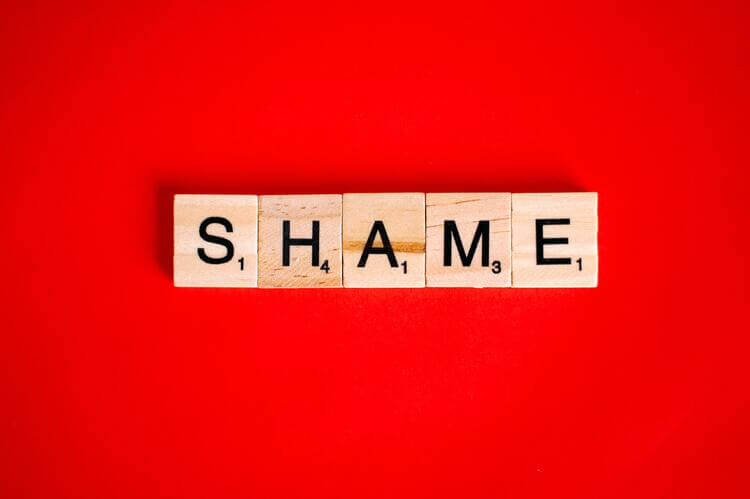What Is Money Shame?
May 05, 2021
Financial shame is an experience that almost everyone has. It's the feeling of shame for having too much or too little money. Money shame can be paralyzing and end up creating problems in your financial decisions.
What is Shame?
Shame, in its simplest definition, is a feeling of being unworthy, unloveable, and not good enough. Shame represents isolation, rejection, and incredible physical pain.
Just the mention of shame alone is enough for some of us to experience shame.
Shame itself is a huge topic, particularly in the field of counseling.
Shame impacts our mind, brain, body, relationships, and spirit.
Shame often goes unspoken but is a painful feeling felt viscerally and experienced physically.
You will often experience shame as the shoulders collapsing, head hanging low, hollowness in the chest, or your sense of self-becoming small within your body.
Why Understanding Shame is So Important
I love the topic of shame for how it's helped me understand myself through time.
The study of shame has brought a deeper understanding of my client's confusing, conflicting, and yes, even immoral thoughts and actions that society and family find so repulsive.
Shame is a big topic. It is also a difficult topic to talk about.
Yet, in order to reduce shame, you must face it with openness, curiosity, love, and compassion.
Shame does not have to be your way of life.
I'm not saying that you should deny the experiences of shame in your life, but rather recognize when you have moved into a state of shame or are living in a chronic state of shame.
I have deep compassion for everyone that suffers from their experiences of shame.
Shame is often found right at the center of psychological suffering buried beneath layers of defense mechanisms, mental illnesses, addictions, and lost or overwhelming relationships.
Shame can become paired with many different aspects of our being, including our financial lives.
Shame is Relational
Shame is a relational experience of not meeting others' or your own standards and then feeling rejected for it.
Shame is experienced as a feeling of being seen in a negative light.
You do not choose to feel shame, rather shame is an automatic response to a scenario in which you do not feel accepted for who you are at that point in your growth and development.

Money Shame
Have you ever wondered what financial shame has to do with your financial well-being? Financial shame can create a deep impact on your finances and your ability to communicate about money.
Financial Shame Develops in Childhood
As children, you are prone to experience shame around wants, desires, and interests with little ability to meet them on your own.
You are dependent on parents for meeting many of your material needs with the money that they have access to.
What you can't know or fully understand as children is the limits of your parent's finances.
You don't know or understand your parents' financial situation.
This creates many opportunities for misunderstanding between parents and children around money and getting your needs met.
When the parents are not tuned into this dynamic or are dismissive, denigrating, or disorganized around this topic it can leave you feeling shame about asking for what you want.
You then may feel shame when you receive a “no” to what you want. This shame expands to knowing what you can and cannot have and feeling insecure about your ability to get what you want through time.
It would be simpler if your emotional reaction to your parents and getting your needs met were isolated to one emotion like shame and that there is nothing else going on.
However, as you interact with your parents around money as children you are navigating getting your own needs met.
You don't have a grasp of whatever is happening with your parents and their ability to be tuned in to their own needs and those of their children. Not to mention that children do not have a grasp on their parent's own shame around money and being responsible for providing care for their children.
Many parents feel the drive to provide a better life for their children than the one they had for themselves.
Much of this is centered around experiences that require larger amounts of money than were available during their childhood.
All of this results in a potentially significant amount of shame around money.
Financial Shame And Identity
Money, like shame, is inherently a relational experience. It's not just related to your personal finances.
You use money to express yourself and how you see yourself in the world.
You know that others will have both positive and negative evaluations of the way that you use and interact with money in your life.
In light of this, what are you to do with your experiences of shame around money so that you can return to or enter into a state of money-love and security?
Remember that money-love and security are about having a healthy relationship with money.
There is not a final goal of accomplishing ultimate financial love and security, but rather a deepening experience of love and security around money.
I have come to deeply appreciate the fields of sex therapy and eating disorders as they have added significant insight into understanding the way that people develop shame around issues related to their identity such as their sexuality and patterns of eating and body image.
You also have a financial identity and image.
You have a money story filled with beliefs that make you view yourself and your finances in certain ways.
This is far beyond when someone steals your credit card information and uses it to buy things you would never buy yourself. Remember the Friends episode where Monica feels confused about who she is because someone steals her credit card and seems to be living a much more fun life than Monica lives?
That's an example of how money and identity are linked.
The sense of violation with stolen financial information helps us understand and remember what a personal relationship you have with your financial life.
Your finances impact how you view yourself. It impacts what you purchase and how you present yourself to the world.
Everyone has a deep and very personal relationship with money in their lives.

What Does Money Shame Look Like?
Let's explore what financial shame sounds, looks, and feels like.
Like a fish in water, you're surrounded by financial shame in all aspects of your life. It's the water you swim in. So you may not even recognize financial shame when it is happening to you.
Money shame happens to every race, class, religion, gender, and sexual group.
No one is immune to experiencing money shame.
However, it is often between these social groups that money shame occurs.
Examples of Money Shame
Please note I am not saying you should feel shame for any of these realities.
I am acknowledging that these are all issues I have either faced myself or helped clients work through.
My hope in naming these realities is to help you come out of isolation and alienation and back into a relationship with yourself and others important to you.
- Not having enough to pay bills or being in debt.
- Making mistakes with money like bad investments or getting into credit card debt.
- Falling behind on taxes and not being able to find a way back out.
- Having more money than anyone else in your social circle.
- Getting a large inheritance and not knowing what to do with it and being told to be grateful for it.
- Not being able to talk with your spouse about money.
- Being passed over for a promotion.
- Crossing social class lines and being expected to know the social rules of that class while trying to figure it out for yourself.
- Being criticized for how much you work or don't work.
- Being criticized for the type of work you do.
- Avoidance of financial documents including budgets, balance sheets, insurance plans, taxes, and estate planning documents.
- Having your financial identity stolen by a family member, friend, or anonymous person.
- Being financially objectified. “Oh because you are rich, middle class, poor you can…”
- Growing up in a family with financial conflict.
- Growing up in a family where everything on the outside looked financially good, but on the inside was a financial mess.
- Religious or spiritual teachings that money is the root of all evil. Money is dirty, bad, or otherwise not good.
- Being accused of being ungrateful, greedy, like a princess, too jealous, lazy etc.
- Business failure and financial strain.
- Having a parent that is very successful in their profession/field, and not feeling like you can ever measure up.
- Going through a divorce and being financially exploited or ignored.
- Being ashamed of your credit score.
- Having a parent that becomes financially dependent on you in your childhood.
- Being told you don't make enough money to work with a financial advisor or financial planner.
- Cultural oppression of your group of people, exploitation of your labor, and in the most severe cases being enslaved for your labor.
Money shame runs the gamut from the innocuous and barely noticeable facial expression between husband and wife that conveys disapproval, to the large-scale traumas perpetrated by one group of people upon another.
While this list certainly does not come close to naming all the different expressions and scenarios that have left my clients with financial shame, it gives you a wide sampling of potential ways that shame can be evoked around money.
However, the word shame is not mentioned once in any of these experiences. Yet it is present in each of them.
How Has Shame Impacted You And Your Finances?
Take a minute to reflect now on what experiences and people in your life have created a sense of shame for you around money.
Notice what physical sensations are coming up for you.
Now bring compassion and warmth to where this is showing up in your body. See if this helps to ease some of the response of shame.
To continue learning how to navigate money shame I invite you to The Couples Guide to Financial Intimacy which will take you on a. fuller journey through your relationship with money and to help you increase your sense of financial freedom.
Would you like more 1 on 1 support? Then perhaps Therapy Informed Financial Planning is for the two of you. I invite you to schedule your free 30-minute discovery call today.
Wishing You Healthy Love and Money,
Ed Coambs
MBA, MA, MS, CFP®, CFT-I™, LMFT
Love The Blog Check Out The Podcast
Curious About Your Attachment Style?
Take the Attachment Style Quiz now and learn how it impacts your relationships, finances, and life!



